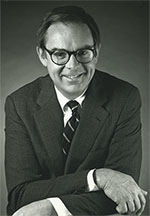James Neville Compton ’64

James Neville Compton ’64, March 17, 2014, in Seattle, from a heart attack. Respected journalist, documentarian, politician, historian, and teacher, Jim’s career spanned many fields. He came to Reed from Klamath Falls. (His father, Art M. Compton, studied at Reed in 1937). After earning his BA in history, Jim worked for King Broadcasting in Seattle, became an NBC News Fellow in journalism at Columbia University, won a Fulbright to study in Romania, and completed an MS in journalism with honors in 1969. Jim went to Italy, working for several years as assistant managing editor for the Rome Daily American. He also worked as a stringer for NBC Radio, Westinghouse, and Voice of America. In 1974, he returned to Portland to work for KGW, then opened KING’s first bureau in Washington, D.C. From there, he joined NBC as the Mideast and European correspondent, based in Cairo and London. He covered Africa, the Middle East, and the Soviet Union, and wars in Lebanon and the Persian Gulf. He interviewed political figures and celebrities alike, including Moammar Gadhafi, Orson Welles, and Jimmy Carter.
“Hard to forget being arrested and held in Tehran, interviewing Anwar Sadat (six of those), and doing a live commentary from Leonid Brezhnev’s funeral,” he later told Reed. “As a reporter, the high points were probably being inside West Beirut during the Israeli siege of the city and doing the NBC flash from Cairo (26 minutes ahead of the next news organization) saying, ‘The Shah of Iran is dead.’”
In 1984, he joined KING-TV and produced a dozen award-winning prime-time documentaries, garnering the duPont-Columbia Silver Baton and the National Janus Award. In 1987, he hosted The Compton Report, originating from KING-TV with regional broadcasts—the program ran 10 years. He also was a correspondent for the NewsHour with Jim Lehrer.
After a distinguished career as a journalist, Jim entered politics, and served six years on the Seattle City Council, where he focused on police accountability and reform of the electrical utility. He retired in 2006 to pursue teaching opportunities as a senior Fulbright Specialist in Romania and Egypt, lecturing and writing about Romanian political dissidents and teaching investigative journalism to young Romanian journalists.
Over the years, Jim volunteered with the Reed alumni association, the alumni board, and the board of trustees. As a U.S. merchant seaman and devoted student of maritime history, he restored an 80-year-old wooden boat, Ranger 7, which was often on display at historic boat shows. He was a fly fisherman and a mountain climber. A student of Oregon’s Modoc Indian War (1872–73), Jim was intent on creating a new history of the conflict. He worked more than 20 years on what he called “the last great yarn of western history.” His manuscript “Kill the Chief” was complete at the time of his death. Jim also pursued an interest in the Romany people of Eastern Europe and elucidated his research in the documentary Voyage of the Gypsies, which traced the roots of Europe’s Roma peoples to India 10 centuries previous.
Jim was a “bigger thinker” than many journalists of his time—a historian with a broader view of news. “If broadcasters give viewers something healthy to watch,” he told the Oregonian in 1988, “they will develop a taste for it. I’m convinced there is an appetite for serious television that examines the issues facing the country in an interesting and in an intelligent way.”
“Of course Jim was incisive,” wrote Abe Bergman ’54, reporting Jim’s death to the college. “He was a Reed College graduate. Seriously, what’s to be done with the (small) band of us who wallow in nostalgia for how television news reporting used to be?”
Jim was married to Seattle attorney Carol Arnold, who survives him. “He had a real zest for life,” said Carol. He is also survived by three grandchildren and stepdaughters Rachel Arnold ’91 and Sarah Arnold.
Appeared in Reed magazine: September 2014
comments powered by Disqus


![Photo of Prof. Marvin Levich [philosophy 1953–94]](https://www.reed.edu/reed-magazine/in-memoriam/assets/images/2022/LTL-levich1.jpg)
![Photo of President Paul E. Bragdon [1971–88]](https://www.reed.edu/reed-magazine/in-memoriam/assets/images/2020/Bragdon.jpg)
![Photo of Prof. Edward Barton Segel [history 1973–2011]](https://www.reed.edu/reed-magazine/in-memoriam/assets/images/2020/Segel.jpg)








































































